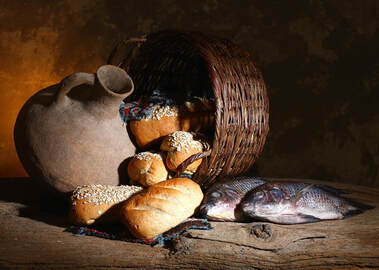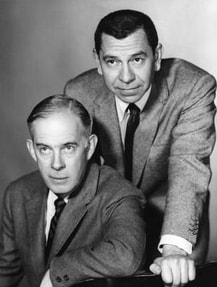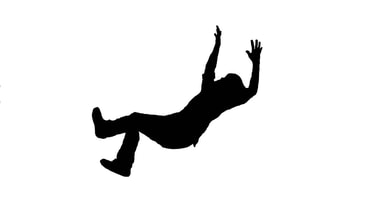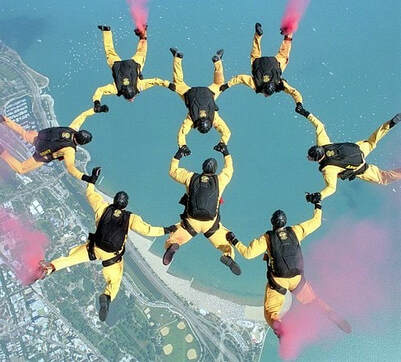all of the selves we Have ever been
 I attended a miracle. It happened yesterday. In a church basement. A friend invited me to the weekly Friday fish fry at her church. We went in her car and arrived to a jam-packed parking lot. We took a spot in one of the farthest lanes. Bracing ourselves against the bitter cold wind that puffed up our coat sleeves and bit at our ears, we tried to find the nearest open door. As we made our way, I noticed that the entire church complex was surrounded by a long string of cars waiting patiently in the take-out line. There were more cars than I have ever seen at any fast food place at meal time. My friend and I arrived inside and followed the hum of voices that led to the growing crowd. The line for food extended from the serving tables through the community room and further on into the multipurpose room. The line was long and slow moving. No one complained. Some children sat on the steps in front of the stage while others dribbled and passed a basketball occasionally shooting at the hoop. It was impossible to tell which children belonged to which adult. There was that loose, pervasive kind of supervision that occurs in familiar places full of multi-generational groups of happy people. A handful of adults sat around a square folding table where candy bars were on sale for a dollar a piece. A preschooler stood at the front of the table happily arranging and re-arranging the chocolate. We got in line behind an older male guest with a shuffling gait. He leaned on a cane. The male guest joined the conversation about the new Menards that opened this week. He told us about the Menards in Cincinnati that is three stories high. In line ahead of the older male guest were a mom, dad and daughter. The little girl was wearing bright pink high-top tennis shoes with floral ribbons for laces. The shoes glittered reflecting the light. Mom told us how the shoes came to be. The father admitted that his daughter got her love of sparkly things from him. We came first to the table where we purchased our tickets. Cash only. No apps. No self-checkout. We received handmade tickets that he been used over and over again; the edges were crooked and the middles worn thin from all of the thumbs that had rubbed them while waiting in line. People stopped to enter the 50-50 raffle, writing their phone numbers on the backs of small paper rectangles. As we progressed toward the buffet, a server appeared out of nowhere to assist the guest with the cane. The server got a tray and waited while the guest made his food selections, and then the server patiently fell into step with the short shuffling gait. Throughout the entire experience, a man kept re-appearing with large aluminum trays full of hot fried fish. I don’t know where he came from or where he went, but every few minutes a voice heralded his return, “Hot fish! Hot fish, coming through!” The service line was as jammed as the parking lot, except it was volunteers and not cars. Mostly older men filled our plates and refilled the serving dishes. School kids in uniforms staffed the dessert table and described the offerings. Men and women wandered the crowd squeezing into the tight spaces between tables and chairs to offer refills for the all-you-can-eat-fish diners. When the space between the seats was too tight, we all pitched in and passed the plates around. The room was loud and busy and joyful. There were babies in car seats, toddlers being offered spoons full of macaroni and cheese by dads who also were trying to sneak in a bit of fish. Parents, grandparents, teenagers, and neighbors--if you came by yourself, you were not alone. Not one individual sat staring into a laptop screen. Not a single cell phone was in use. The whole scene was so familiar. This was how I grew up—in church basements, at the VFW, the fire hall, the school auditorium. These were the places where my worlds and my people came together for fish fries, weddings, funerals, BINGO, bazaars, festivals, bake sales, school plays, and concerts. These gathering places were home away from home. It was a good feeling and a kind of dessert all its own. After we finished our meals, someone came to take our trays. My friend and I squeezed between chairs and into the main aisle. A man approached us to thank us for coming. He invited us back on one condition—that we bring two more with us. Maybe that is how miracles happen—people come two-by-two and sit side-by-side. We gather together in the spirit of community and the fish multiply. I will be back, and next time, I’ll see what happens to the water!
0 Comments
 Is anyone else hungry? The chaos of the world seems to lower my blood sugar and stimulate my appetite. I get so hungry for the truth. We can no longer ask the questions that would lead to conversations that help us grow in understanding because we are trapped by “political correctness.” Labeled as intolerant, we can lose our jobs, relationships or social standing. Things are happening out in the world, big things, dangerous things like Coronavirus, war in Syria, the integrity of our democracy, but we get “spin” instead of truth. I think they once called that propaganda. Tell the truth at work, and you will find yourself on the discard pile of “disgruntled” employees. It doesn’t matter if you are a parking lot valet, a former CEO of the largest corporation in the world or a decorated military genius. Your entire career can be dismantled by trying to speak the truth to power. Doctors can no longer tell the truth to patients without being accused of some new form of “shaming.” We live in a litigious society. In response, various programs pop up from time-to-time that attempt to train us to walk the tightrope that is “risk management.” I once attended a required training on “the blameless apology.” How is it an apology if someone does not accept responsibility? I wondered. But, of course, I couldn’t ask that question. As one of my graduate school instructors once said, “When walking a tightrope, you are dead no matter which side you fall from.” When I was young, there was an old black and white TV show called Dragnet . The show continues to play in re-runs and re-makes. Primitive by today’s television production standards, the original TV series was digestible even for children. The show followed two Los Angeles police detectives led by Sergeant Joe Friday. The show’s opening featured music and then a voice that said: ”Ladies and gentlemen, the story you are about to hear is true. Only the names have been changed to protect the innocent.” When being interviewed by the police, witnesses would often digress and ramble on. Sergeant Friday was famous for saying, “Just the facts, ma’am.” The detectives were extremely respectful as they uncovered the truth. I compare those images to the ones that flood the eyes of children today. And the things they hear! There is an apology to be made, and not a blameless one. Some folks make fun of those old 1950s TV programs saying that they weren’t realistic enough. The shows portrayed life too simply. Everyone was a goody two-shoes. What an irony. We are now flooded with gory “realism,” and still we are hungry for the truth.  Beware! Children are watching us. Many years ago, I stopped at my mother’s house for a visit. She was busy working in the kitchen. My nephew was playing in the adjoining family room. My mother and I began to chat about a situation involving two adults that we both knew. As we each expressed how puzzled we were by the actions of these other adults, my nephew poked his head into the kitchen and said, “It’s like I always say, things are never what they seem.” Like he always says? He was only three! He had been walking upright for only two of those years and forming complex sentences for only one of them. Yet, here he was all full of insight. The situation was clear to him. He was already becoming an expert on human behavior. When my daughter, Emily, was in kindergarten, she came home one afternoon and sat herself down at the foot of my bed where I was sitting to do some mending. Emily proceeded to tell me of an incident that had occurred on the playground that day. The teacher and the principal had gotten involved and given all of the girls a good talking-to. Emily recounted the details of that conversation. She then went on to share some of her additional observations from the playground that day. I told Emily that this news was very concerning, and I was going to have to call the principal. Emily said, “Well, I think you should!” I phoned Vickie, the principal. She asked me how I knew about the day’s events. “Emily told me,” I said. I also shared Emily’s additional observations from that day. Vickie told me that she and the teachers had been meeting and worrying about how best to handle the situation, especially with the parents. She was relieved by the additional information that Emily provided. Vickie inquired why Emily had not spoken up during the talking-to. “I asked Emily the same thing,” I said. Emily had rebuked me, “Clearly, Mom, it was a time when children should not speak!” Emily was barely five and already an advocate for truth and justice, but she also understood the constraints of adult social norms. All was clear to her, and Emily was on her way to becoming a woman of action. Soon after the start of his first grade year, my son’s class was scheduled for a full week of standardized testing. Rather than be nervous about the testing experience, Sam was excited. This seemed like big kid stuff. Each day of that week, Monday through Thursday, Sam came home and gave an update on the testing. From his reports, it sounded like all was going well. On Friday, Sam came home, slammed down his backpack, and made a big pronouncement. “Well, Mom, I hope you won’t be disappointed in me!” “Why would I be disappointed in you, Sam?” He had definitely aroused my curiosity. “Well, Mom, all week the teacher has been reading the tests to us. Today, we had to read all the questions ourselves.” “And?” “Face it, Mom! Just face it! We’re in first grade. We don’t know how to read!” Sam was discouraged by the adult logic. I could see his point. Sometimes grown-ups make no sense at all. And sometimes children are smarter than we think.  I texted a friend, “Well, it’s official. I’m old. I’ve had ‘the fall.’” It happened on a Saturday morning in front of a men’s clothing store. It was an unseasonably warm Saturday in winter. The sidewalk was illuminated by bright sunshine. I didn’t think to look for ice, but as I took a few steps out of the door, my feet went straight out in front of me. Thankfully, I landed on my well-cushioned bottom and somehow managed to strain my upper body forward in a modified crunch/sit-up protecting the back of my head from crashing to the pavement. The full force of the fall was absorbed by my left hand and arm, my dominant side. I sat on the sidewalk for a moment. A woman was getting out of her car and saw me fall. She kindly offered to help me up. I sat on the cold, wet sidewalk for a moment to collect myself, and then I walked on my knees to the wall and held on as I lifted myself to standing. Badly shaken, I went back inside the store to report the fall and to encourage assistance for an older gentleman using a cane who had just entered the store. The shopkeeper was kind and concerned. She wanted to call the emergency squad which I did not feel was necessary. She took my contact information and offered me an ice pack for my scraped and reddened hand. I sat for a few minutes on a stool next to the cash register, and then I drove myself home. My son came by and I described the fall to him. He said he wouldn’t be surprised if my neck was hurting by morning. Sure enough, the front of my neck was stiff and sore by the time I went to bed, but I was grateful that my neck had the strength to hold my head and protect it during the fall. Over lunch a few days later, I told a friend and fellow social worker about the incident. I expressed much surprise by how badly shaken I felt for the next couple of days following the fall. “Trauma,” she said. “Falls are a kind of trauma.” Trauma. Hmmm. As a social worker and therapist I have come to know people who have survived the atrocities of war, survived the Bataan death march, the Holocaust and the tyranny of Stalin. I’ve met children disfigured by a lifetime of abuse. Myself, I have survived a life-threatening medical emergency that literally took me to the other side. I use the word “trauma” carefully. And yet, I did feel traumatized by this relatively minor event. It happened so quickly, I didn’t see it coming nor did I see myself falling, but the event rattled all of my senses. More, it left me with a changed view of myself. The gal who always feels youthful and strong on the inside seemed to disappear in the nanosecond that it took for my bottom to hit the sidewalk. I was changed. A friend tries to reassure me that anyone at any age could have slipped and fallen that day. After all, it was icy. True, but it means something different to a person of a certain age. Perhaps youth and older age are not separated by decades. The divide may be as narrow as one thin icy line on the sidewalk.  In search of some old, important documents, I stand on a metal chair, and stretch on tip-toes to reach the boxes on the highest shelf of the cavernous storage closet. I struggle with boxes of many sizes and different weights. They are topped by old pieces of construction paper art work created by my children many years ago. I carefully slide the art work out of harm’s way. The box I need is here somewhere, squeezed between a library of old photo albums and a pile of small keepsakes that rest loosely on the shelf. I fear the entire contents of the shelf will come down on my head, but I have no taller ladder, and the documents must be found. Pulling the larger boxes down, one at a time, I finally lift the corner of a lid and know for sure I have found the right carton. A small white prayer book peeks out at me. The binding is cracked and the picture of Jesus surrounded by children is faded, but it is still beautiful. Inside I recognize the wobbly cursive of the second grader that was me. I remember how proud I was the day I received this little book. Something momentous happened in the conveyance, and I became a member of the special forces. I carefully turn the pages that contain a few short prayers and many beautiful illustrations. Young children can’t read a lot of big words, but the pictures tell the stories. They spoke to me then. They speak to me now. When I think about other pray-ers, President Abraham Lincoln always comes to mind. I admire him for his conscience and his moral courage, for rising to the occasion whether in his struggles to maintain his mental health, coping with the death of a child, facing the issue of slavery, or commanding a country at war with itself. I recall that Lincoln said he was not so much worried about God being on his side, but whether he was on God’s side. Lincoln reported that he was often driven to his knees because he knew he had nowhere else to go. In 1999 the talk show host, Larry King, wrote a book called Powerful Prayers. King used his interviewing skills to have deep conversations about faith, hope and prayer with the powerful and famous. It was interesting to see where thoughts turn in the lives of people who carry big responsibilities and much influence. In many ways, they were so much like me. During my years as a hospice social worker, I listened to the prayers of the dying. Sometimes I was asked to pray with them. Occasionally, some who had reported being atheist or agnostic, found themselves urgently requesting a chaplain in their final days. There were times when I would arrive at a patient’s home and be moved by an invisible Presence, and I would think, “God is here.” Other times at a bedside, I would study the movements of devoted caregivers and realize their entire lives were action prayers. I recently went to see the Mr. Rogers movie, a Beautiful Day in the Neighborhood. In the film, Mrs. Rogers shares that her husband worked at becoming who he was. One of the things he did each day was pray for people by name. How lovely to think that someone whispers your name to God each day. It reminded me of research studies on intercessory prayer where the subjects being prayed for improved more than the control group. Hmm. The Irish-born writer and atheist who later became a well-known theologian, C. S. Lewis, said of prayer, “I pray because I can't help myself. I pray because I'm helpless. I pray because the need flows out of me all the time, waking and sleeping. It doesn't change God. It changes me.” When my son was little, he did not care much for going to church. He tried to shore up his argument in favor of not going to church by saying that he did not believe in God. At a later time when his mind was troubled, and working on a problem, he said, “Mom, maybe God…” Then he caught himself, and quite puzzled said, “Hmm. Maybe I do believe in God...” It was both a question and an answer. Not everyone is a believer. Not all who believe share the same beliefs. But I’ve learned that most of us are talking—sometimes silently, sometimes out loud, sometimes it is quick words of thanks, other times, lengthy and desperate pleas, and often, we are engaged in rambling conversations. Some call it prayer. Some call it therapy. Some call it thinking. Call it what you may, but I have learned that it changes things, and it changes me.  Back in the mid-1970s if I had told my father that I planned a future career as an “influencer,” he might have been impressed by the job title. After I explained further that said career path would involve making a sex tape and putting it out there for the entire world to see so that I could leverage my notoriety into a reality TV series and a product line…Well, you would still be looking for my body. Even if I had reported a much less ambitious dream—say, selling vagina-scented candles, my dad’s head would have exploded. Those were not the types of influences parents desired for their children way back then. Character was reflected by the company you kept. There were good influences and bad ones. How many times did I whine, “But everyone’s doing it!” And how many time did I hear the parental refrain, “If all your friends jump off a bridge, are you going, too?” In the years following his military service, my father worked as a salesman. He read every book and listened to every recording on sales, positive thinking, and optimism. When dad dropped us off at school in the morning, he would say, “Make As”—not “Have a nice day” or “See you later.” Make As. I didn’t take it seriously at the time…or did I? Perhaps dad was an influencer. Immediately after high school, it was not good timing for me to head off to college. By some miracle, I got a job as a legal secretary to the managing partner of a large trial firm. I had no idea why someone in his position would hire me right out of high school with no secretarial background except that I could type. My boss was smart, successful, kind, and admired by his peers. One day he told me that he had hired me because of the potential he saw in me. Often during the next few years he would pass by my desk and ask me, “When are you going to go to college and come back and be my partner?” I have tears of gratitude in my eyes as I type this. A definite influencer! When I finally started taking college classes at night, I prepared a long-handwritten essay for a final exam. The essay was about the play The Effects of Gamma Rays on Man-in-the-Moon Marigolds. I no longer remember what the play was about, but I do remember that my professor called me at home. She was excited and asked me if I would like to publish the essay. Did she have the correct student? The right phone number? Influencer. Some of the most important influencers in my life have been people I knew casually who later called upon me in their hours of need. A friend on dialysis, a neighbor diagnosed with kidney cancer, a former co-worker diagnosed with Huntington’s Disease. They knocked on my door or rang my phone and asked me to walk the journey with them. I have had no greater honor. They have influenced my view of everything I consider to be honorable, courageous and important. As a kid, I probably rolled my eyes one too many times when getting the lecture on choosing your friends wisely. Now, with the long view in mind, I get it. We are under the influence of the company we keep.  mes When I was a young teenager growing up in the suburbs of Pittsburgh, Pennsylvania, we had a night time ritual in our home. It was called “closing up for the night.” The last one up walked the house checking the stove, turning out lights, tightening the faucet handles, and locking the doors. Of course, it was usually a parent doing these things. After my parents divorced, it fell mostly to my mom, but occasionally to me. One night both mom and I were still awake when it was time to close up for the night. We each started walking about the house checking the stove, the faucets, and the lights. We both arrived at the door to the basement at the same time. I was better positioned, and so I opened the door and looked down the steps. It was dark. I quickly closed the door and slid the chain lock into place. I turned to my mother and said, “Whenever I open that door, I am afraid there will be a stranger standing on the other side.” My mother said that she, too, experienced the same thoughts and feelings whenever she closed up for the night. Many years later, as a social worker, I met a mother who was caregiver to an adult son. The son had been a soldier in Vietnam and had returned from his service with both his body and mind significantly altered. Though it was difficult for her, the mother took the public transportation to visit her son every day. The mother told me her son had been a happy-go-lucky boy. He always had a radio playing and a song in his heart. I asked this mother what it had been like to see her baby boy come home from war in this condition. “You’ve got to stay prayed up,” she said. Fast forward another dozen years. I attended a conference in New York City. Present were Holocaust survivors and individuals who provide services to them. A woman in the audience shared her family story of survival during World War II. When circumstances became too dangerous for Jewish people to remain in their homes, this woman’s father arranged for the family to go into hiding on a farm. One day while the family was hiding, some Nazi soldiers drove onto the farm and spoke with the owners. Fearing that his family had been discovered or soon would be, the father gathered his family together and said, “We must separate.” He sent the family members off in pairs giving each pair a specific address where they could hide. The father said, “This war will end, and when it does, we will all meet again.” He gave them a location where they should meet when the war was over. Miraculously, they survived the war. That night at the basement door, I first learned that being a parent is scary business. More than the talk about the birds and the bees, those brief words at the door explained the significance of having a child. Over the years, the experiences of other parents confirmed the lesson for me. After I became a parent myself, I learned first-hand how terrifying it can be. To love someone who believes in you is holy. Even the mere thought of being powerless, leaving them unprotected is unbearable. I have said a lot of prayers in the dark. It does not get easier as they grow up. Their problems and the consequences grow larger along with their bodies. They move away from our houses. We can’t see the stove, the faucets, the lights, or what’s behind the basement doors in their homes. Like all of the parents in these stories, it is both because of my children and for them that I am wiser and braver than I might otherwise be. Though I made many mistakes as parents do, I hope my children learned how to be brave when they are frightened, and how to close up for the night. |
AuthorLilli-ann Buffin Archives
July 2024
Categories
All
|
 RSS Feed
RSS Feed